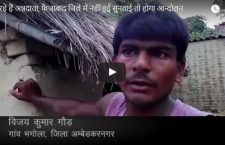Is there a vocabulary for the story of the ever-after, for a woman who survives rape, apart from that which society uses to pin down and judge and label her? Because it is somehow never enough that she has had to live through something as violent as a rape.
If in our cities we are fighting to reclaim the streets, take back the night, and have the freedom to be able to wear what we want, say what we want, go where we want, without being told ‘It’s your fault’, the story that unfolds for our sisterhood in the villages is far worse, where the onus of a rape lies mostly, if not always, on the girl herself.
In just such a bone-chilling case that has come to light in Lalitpur, a woman who was raped by five men continuously for months, was tried by the village panchayat and deemed guilty. A story we dug up after incessant searches, both online and off, so hushed it all was. A sentiment that found resonance in the faces of the villagers – all of them shutting their doors on us, refusing to comment.
The matter came to light when the perpetrators attempted to orchestrate an abortion for the girl who had become pregnant, but failed. The news spread across the village, after which the panchayat decided to weigh in, in the name of “gaon ki izzat” – they “ordered” an abortion too. And there followed not one or two or five, but 21 panchayat sessions to decide on the fate of the girl and her family – a pronouncement of virtual excommunication. According to the complainant and her family, the Panchayat ordered them to pay a fine, or to leave the village altogether. The girl’s brother tells us, “We were ordered to pay a fine of Rs.11,000 in order to erase our offenses. In addition to that, we were all made to touch the feet of all the male members of the village, and the neighbouring villages as well.” And subsequent panchayat sittings added to their woes; the father says, “We just kept having to pay more and more money.” The amounts, it seems, were randomly decided,“Sometimes it was Rs. 10,000, then Rs. 5,000, Rs. 6000.” The family seems to have lost count on the number of panchayat decisions. When we ask him why they accepted the decision, the father is non-committal, “We accepted our mistake because the villagers insisted it was our fault.” The brother is more vehement, “What else could we have done? This is our home, our village.”
The girl and her family, who refuse to be named, were subjected to nothing short of being social ostracized, “They didn’t give us access to food, water, anything. We couldn’t even walk on the streets.” He adds, the desperation apparent in his voice,“I wanted to clear our names in the village, that’s very important for us. After all, it’s a matter involving over 1,000 people.”
At the end of their tether, the family finally sought the aid of the police. They filed charges against the rapists, who have since been arrested and booked for rape, but there is no legal respite for what the family is facing everyday. According to the Commanding Officer at the police station, Himanshu Gaurav, since it is a matter involving a panchayat’s decision, the police cannot take any action unless the family approaches them with that specific complaint. If they do, he promises strict action against the panchayat for “making such an unconstitutional decision”.
But a police case would only help marginally, if at all – this we know, as does the family, from years of sweating it out in Bundelkhand – your aas-pados holds great control over you. An impending marriage in the family – of another brother – was perhaps the reason why the family held back. Who, after all, would participate in the celebrations if not the local villagers? “Before we began preparations for the marriage, we asked all the villagers if they would be a part of the festivities, and they all agreed,” they share,“We began preparations in full swing, sparing no expense. But on the day of the wedding, the entire village boycotted us, refusing to eat anything we had prepared. They called us criminals.”
When we tried to contact the village pradhan, he who is meant to look after the best interests of his village folk, he refused to open the door, let alone comment.
In all the grave and dreary silence, what the girl said to us, off-camera, echoes in our ears, “When they would rape me, they would threaten me non-stop, saying they would kill me and my family if I ever spoke up or lashed out.” She pauses, and adds, “They forced themselves on me multiple times.”
But that is not the issue here, is it?

